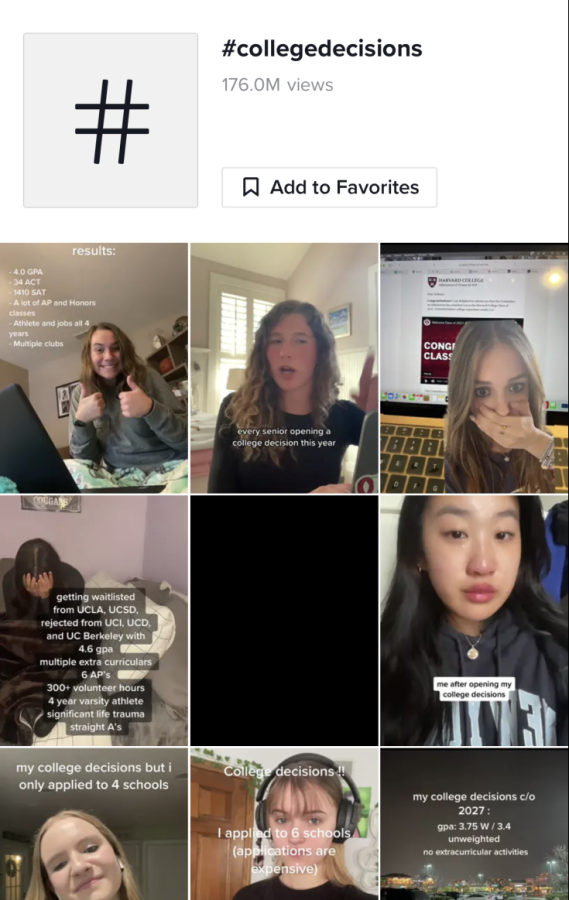As college applicants finish receiving their decisions, fallouts are bound to happen. For some, the season is a celebration of a lifetime of work. For others, it’s a period of mourning for time and effort rendered futile.
Wanting to share their emotions with the world, many seniors took to social media to share their reactions and results. For those who got into their dream schools, the sense of achievement was palpable. Watching videos of their reactions, the relief in their eyes was immediately visible when they realized all their accomplishments paid off.
Senior Anagha Sudhindra has experienced this side of social media herself, but not yet participated in it. “I have considered posting my acceptances and rejections but I’m not sure if I will go through with it… [sharing decisions on TikTok] can get really toxic,” Sudhindra reasoned.
The unlucky ones have reactions ranging from numb melancholy to despair and hopelessness. Many cope with humor, making compilations ranking the schools that rejected them and sarcastically insisting that they never even wanted to go to the schools that rejected them. The more earnest accounts label themselves as failures, mourning the futures they insist are ruined.
Junior Margil Sanchez Carmona has noticed that numbers of positive and negative videos are not consistent. “I’ve seen more people posting rejections, which sort of creates a negative mindset among students,” he explained. This has impacted his own perspective on the process. “It’s concerning how there’s so many picture perfect students getting rejections, but I think the lesson here is to focus on myself. It’s no use comparing oneself to others,” Sanchez continued.
Looking into the comments of any college decision video, one will see younger students asking time and time again, “stats?” For these high schoolers, current seniors’ acceptances serve as a do/do not guide, instructing them in how to get where they want to go. The stats in question? Standardized test scores, GPA, number of honors and AP classes, and extracurriculars. Certainly factors of the admissions process, but not everything.
Having a role model, or something to live up to, can be inspirational, giving juniors and younger students a sense of comfort. Many believe that if they can achieve the same things as an accepted student, they will be granted admission themselves. However, the accomplishments of some students are unachievable for others, and there’s no certain formula. The same statistics can be applied to multiple colleges or students, and they will receive totally different outcomes.
Sudhindra find the admissions process to be much more complex than is reflected by social media posts, “Students never really know what a college admissions officer is looking for, so posting decisions next to a collection of stats really never shows the full picture, which spans far beyond into affirmative action, region, essays, legacy, extracurricular activities, and more,” she shared.
For viewers, this content is largely discouraging. Students may think “If they couldn’t get in, how would I?” The culture becomes pessimistic and pressurized as the need to compete becomes even stronger. An ever-present desire to one-up the competition causes students to push themselves, giving this generation record-breaking stress levels; 75% of high school students reported feeling considerable stress about academics.
One current senior, under the name @brown.unofficial on TikTok, created an entire fanpage for her hopeful university before acceptances were even released. She posted videos about the school and her reasons to want to go there for months before ultimately being rejected on Ivy Day. In her comments, other students commiserate the disappointment and lament their own chances.
Among the negativity, a few people are hijacking the college decisions hashtag to bring optimism. They share stories of how their rejections ended up being the best thing to happen to them, attempting to cheer up the disheartened. Accounts from current college students promise “you will end up in the right place” and “everything happens for a reason,” phrases that sound nice, but are relatively meaningless to heartbroken students.
Sanchez feels this type of video is much more useful, “I think the best thing to gain is optimism from older students who figured out what to do after their first rejections.”
Ultimately, there is little to be gained from this online community. The further you look, the more the pages draw you in. Sure, they may tell you the secret to getting into Yale, but the advice will contradict itself more than form a coherent set of instructions. Besides, even following an exacting regimen isn’t foolproof. College admissions aren’t a game to be rigged or manipulated, so someone else’s rule book can’t help you win.









